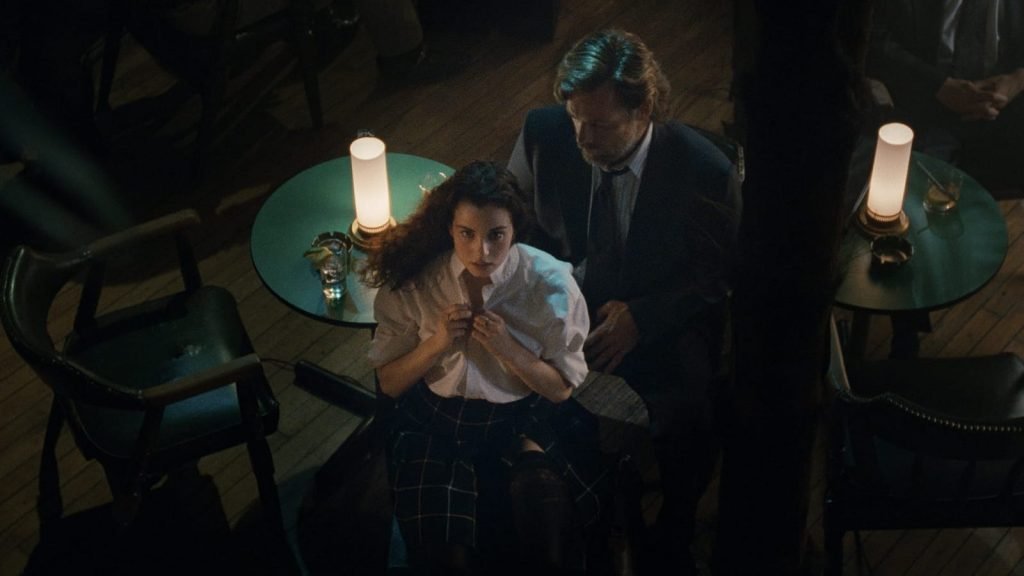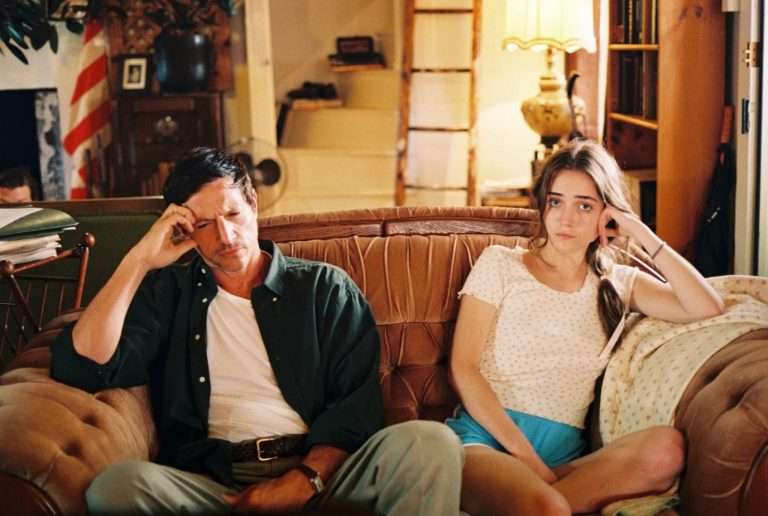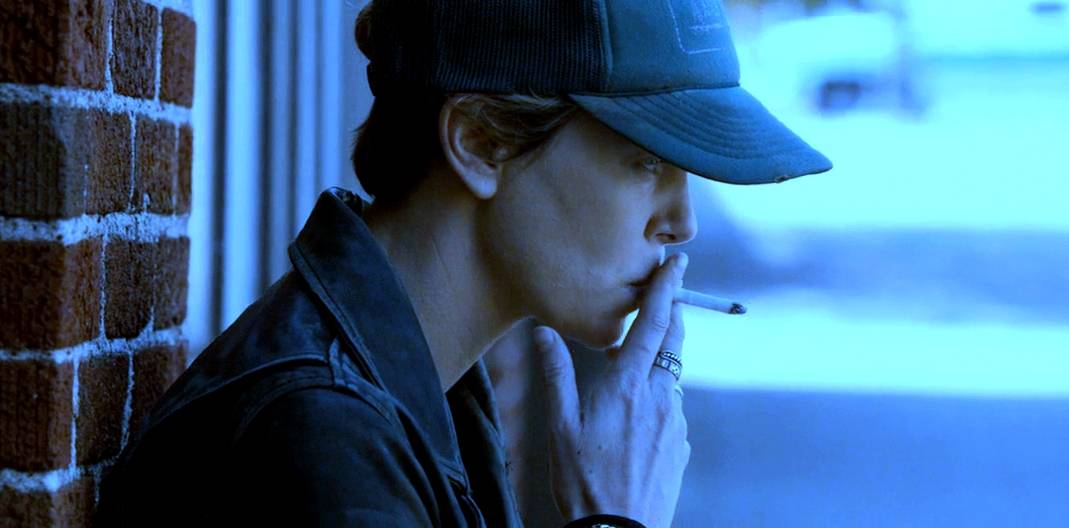Exotica (1994): A Confounding Tale of Strange Obsessions and Unbearable Suffering: What happens when you lose someone close to you? How do you go on about your life as if nothing happened? The shadow of their memories engulfs your footsteps – their existence reduced to a recurring nightmare. Beneath the veneer of normality, a highly inflammable fluid boils vigorously, waiting to burst into a cloud at any moment, exposing the facade. The ones hiding such pain are left to pick up the remnants of a once-thriving household. They unsuccessfully try to put the pieces back together in a desperate attempt to reconcile with the past. To forget their mistakes, wash away the guilt and sorrow, rinse themselves off the muddy sloth of regret, and turn into a clear spring. However, the tenacious grip of the vulture’s claws never lets go of your neck. The suffering is enormous and sometimes eternal, no matter how much we wish the opposite to be true.
Exotica, directed by Atom Egoyan, embodies this spirit of concealment by playing with audience expectations. Underneath the garb of an erotic thriller, it reveals a deeper, mystifying tale of intense psychodrama where the characters never mean what they say or say what they mean. The content belies the title, and the posters, specifically designed for mass appeal, promise a hot, charged-up cocktail of lust and sins. But the movie never plays out in that manner. It uses the setting of Strip Club and its performative nature as a premise for unveiling various afflictions of the human psyche – loneliness, love, betrayal, grief, and fantastical escapism. Four intertwining stories converge at this place which sounds improbable but develops organically in the movie. The ritualistic nature of such forbidden gardens of temptations becomes the perfect catalyst for psychological dissection.
The plot follows four different characters in a hyperlink format. At a strip club named Exotica, Francis, a revenue auditor, indulges in an obsessive role-playing routine with a dancer, Christina, every night. Eric, the club’s DJ, watches her perform for Francis with jealousy and frustration, introducing her passionately as a schoolgirl on stage. The sweet-natured club owner Zoe is concerned about the discomfort this causes to the customers. She is pregnant with Eric’s baby as a part of a contract which has disturbed Christina, causing tensions between them. Also, Francis goes to a pet shop owned by Thomas Pinto for auditing. Thomas is a reclusive, socially awkward man who secretly smuggles rare bird species eggs and is a closeted homosexual. Francis also takes his brother’s daughter Tracey as a babysitter to his house daily. When Eric manipulates Francis into touching Christina, he gets thrown out of the club. He then blackmails Thomas to go and interrogate Christina at the club, threatening to reveal his smuggling operation to the bank. As these four people converge at Exotica, all hell breaks loose with shocking revelations and confessions dredging up the buried corpses in an enigmatic face-off.
The movie lulls the viewers into the labyrinthine alleys of Exotica through swift, smooth camera work. The camera glides across the fences and one-way mirrors, accompanied by the soulful, enchanting musical score, to reveal the voyeuristic nature of the inhabitants. Fortunately, it is not interested in showing the flesh of the performers. Instead, it invests us in the soul of one particular customer – Francis. It would be silly to assume that such transactional relationships only deal with carnal desires. This place holds more secrets and intricately layered exchanges to pass off as superficial pleasure-seeking. Through Francis, we get a general idea about the anxieties and worries of other customers. The purpose of their visit could range from fresh entertainment to therapeutic catharsis. But it is never frivolous. In fact, it’s always brimming with the unsaid feelings held back to avoid judgment, slowly released in the case of Francis.
Even the workers, from the owner Zoe, dancer Christina to Eric, can’t get rid of their personal baggage. Zoe is forcibly trying to emulate her mother’s sense of freedom, knowing well that she can’t replicate it. Eric is a forlorn lover, creating narratives for his self-satisfaction to deal with the pain of separation. His inability to understand his damaged relationship with Christina makes him unsettled. Thus, he starts spinning dramatic inner monologues about schoolgirls, disturbing Zoe, and probes into the delectable fantasies of its clientele. He refuses to acknowledge reality and talks to himself to reconcile the shared moments with Christina. But, as he claims in his first meeting with Christina, he cannot move forward due to his habit of never being satisfied. He claims to have a purposeful life with ambitions and desires, where days just don’t pass by like passengers in a train compartment. Yet, he is doing the exact same thing, pining for their lost spark and sabotaging her current arrangement with Francis.
Francis, not much unlike Eric, is also stuck in the relics of demolished ruins. His elaborate fantastical ruse with Christina and Tracey does him more harm than good. Christina plays the role of his daughter in danger, who needs protection and assurance that no one will hurt her. Tracey keeps on babysitting even though her daughter is long gone. He tries desperately to keep her alive, not only through memories but in flesh and blood through self-deception. Deep within himself, Francis also knows that this illusion cannot sustain forever. Yet, he is so afraid of breaking it that he vows to kill the man who caused its end. Loss has been constant in his life, whether it was her daughter or his wife, who also had an affair with his brother Harold. These meetings with Christina fooled him with a false belief – that it could ameliorate his suffering. It provided him with a way to deal with his grief, the chasm created in the annals of his bosom. But he knew his pain was eternal and deeper than an ocean. Perhaps Christina could provide him with an outlet to release those suppressed waves lurking in the well of his being.
In the end, we see that Christina had her own reasons for paying special attention to Francis. He consoled her and gave her much-needed comfort when she was at her lowest, babysitting for his daughter. She understood his pain and suffering to some extent, having seen his love for his daughter. Replacing his daughter’s role was not her motive. She only wanted to be a vessel for his healing process, no matter how strange or obsessive it seemed to the onlookers. A lot of their exchange was between words. What they said didn’t matter as much as what they didn’t say. They knew they were holding an entire world between them – full of mutual consideration and co-dependent putrefaction. Forces beyond the scope of their knowledge have entangled them.
The use of Leonard Cohen’s song “Everybody Knows” is ironic. No one ever truly knows what is going on inside the head of others. Atom Egoyan makes sure of that. His disjointed narrative structure, like pieces moving on a chess board to a common strategic point, purposefully creates this opaque network. He never reveals the motivations of the characters – whether it’s the cop sleeping with Thomas and going off with his eggs or Thomas’ decision to help Francis kill Eric. We need to gain perspective from their actions and exchanges, which fumes with an underlying tension. The relief provided by the temporary set-up with Christina is only known to Francis. We can only sit back and presume its therapeutic effects or if “everybody really knows” what goes on in this world. The neon glimmer of the club Exotica cannot hide its secrets forever. It slowly gets ripped to shreds, visibly naked to the entire spectators, much like its undressed performers. Raw and uncompromising with no holds barred.



![The Eternal Breasts [1955] Review – A Portrayal of Female Desires and Creativity that’s Daring for its Time](https://79468c92.delivery.rocketcdn.me/wp-content/uploads/2020/09/The-Eternal-Breasts-1955-768x409.jpg)



